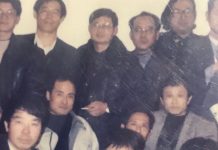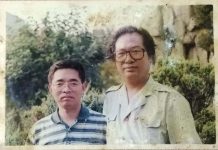Chinese Democracy Party Members Arrested; Support Echoes at Home and Abroad
作者:袁崛(中国民主党党史法规部长)
编辑:罗志飞 责任编辑:鲁慧文 翻译:鲁慧文

中国民主党人:吕耿松 江棋生(未正式入党) 朱虞夫 王东海 祝正明
1998年6月25日王有才、王东海、林辉三人去浙江民政厅申请注册成立中国民主党浙江筹备委员会。在美国总统克林顿于7月3日结束中国的访问之后,中共开始了对中国民主党创党人员的大抓捕。7月9日开始,中共相继逮捕了王有才、王东海、朱虞夫、祝正明、王培剑、程凡、吴高兴等中国民主党浙江筹备委员会成员。 中共当局在杭州大肆逮捕中国民主党人引起中国大陆及海外民运人士的强烈谴责及抗议,并要求立即释放被扣押者。
据当时《小参考》等媒体报道:中国民主党海外发言人徐水良以中国民主党名义给联合国和各民主国家发布照会“联合国和世界各民主国家政府:中共当局大规模逮捕搜查与迫害中国民主党成员,严重践踏国际公约所规定人权准则。我们呼吁美国政府和国会,密切注视事态的发展,你们有责任与中国政府交涉,以阻止事态的进一步恶化,促使中国政府纠正侵犯公民人权的行为”。

王丹、柴玲等民运人士呼吁波士顿政府断绝与杭州姐妹城市关系,在一封致波士顿市长,市议会的公开信中,著名民运人士王丹、柴玲、刘刚、王希哲、杨建利、沈彤、李兰菊等签署呼吁制裁中共杭州公安局最近的严重侵犯人权行为。
中国十九省市一百位政治反对派人士(包括林牧、秦永敏、刘贤斌、高洪明、江棋生、谢长发、吕洪来等)就浙江警方“7·10”大搜捕事件以及外交部污蔑、诽谤“持不同政见者”事发表致中国国家主席江泽民、国务院总理朱熔基的公开信,信中“惊悉浙江公安当局以危害国家安全的名义,将“中国民主党浙江筹备委员会”申请人王有才、王东海、及朱虞夫。。。。。。等持不同政见者强行拘押。对此,我们深感忧虑和痛心。
。。。。。。我们吁请中央政府督责浙江公安当局立即纠正这种侵犯人权的错误行径,尽快释放王有才、王东海、朱虞夫、祝正明等五人”。(来自法新社报道)
全美学自联关注中国人权恶化趋势,发布公开信呼吁美国国会制裁中共。在这封致美国国会的英文信中,理事会主席李靖泓呼吁国会重新评价克林顿总统的中国之行,并要求立即中断美国和浙江省的贸易、文化、科技交流项目。
大陆四名异见人士陆续加入绝食抗议为抗议中共当局拘捕王有才等五名「中国民主党」成员,并呼吁海外民运团体团结起来声援他们的行动。浙江政治反对派运动人士吴高兴,叶文相和傅全三人,发表了《绝食宣言》。三人于七月二十日中午十 二点整开始四十八小时的绝食抗议。
魏京生、王丹、方励之、刘青、王军涛、陈一谘和刘宾雁等十六名海外中国大陆异议人士,七月二十日发表《致江泽民主席暨克林顿总统公开信》,就中共逮捕筹备成立「中国民主党」成员一事,提出谴责与抗议。公开信要求江泽民「维护宪法尊严,制止违宪行为」,命令中共警方立刻释放被违宪逮捕的王有才、王东海等人,这五名被羁押的浙江异议人士因申请成立「中国民主党」遭到逮捕。他们在致江泽民的公开信中说:「在克林顿访问中国期间,你们的联合记者会使我们产生了真正的希望,因为你们曾公开讨论人权问题。」不过,公开信中说:「不幸的,最近的发展使这项访问带来的正面的成果荡然无存。」(来自法新社报道)

与此同时,国内民运人士为中国民主党成立法律后援会和律师团,并聘请律师组成了律师辩护团,为浙江民主党被捕的王有才、王东海、林辉、祝正明等人士进行法律辩护,进一步声援浙江民主党组党人士,在法律层面上与中共抗争。国内支援浙江民主党法律后援会由著名异议人士、前胡耀邦的秘书林牧先生及北京著名民运人士徐文立等人为首,参与人员遍及全国十几个省市。
自6月25日中国民主党人公开申请注册以来,中共便开始了陆续的抓捕行动。7月9日开始的这场大抓捕是“发生在中共为改善自己的国际形象,自1989年“六四运动”之后的第一次大规模镇压,更是出现在中共承诺签署联合国《公民权利与政治权利国际公约》的前夕,引起了国内外的一片哗然,联合国人权专员玛丽.罗宾逊立即动身前往中国交涉。中国民主党人的英勇行为感染和鼓励了海内外的民运人士,“吾道不孤”,海内外各民运人士和团体都站出来发表声明,谴责中共的违法行径,呼吁美国政府和国际社会关注中国民主党人被中共抓捕的行为。国内民运人士同时也组织法律后援会和律师团,用法律武器对抗中共对民运人士和民主运动的侵犯。国内外声势浩大的声援终于迫使中共当局在玛丽.罗宾逊专员到达北京前夕释放了所有被抓捕和“监视居住”的中国民主党人。
Chinese Democracy Party Members Arrested; Support Echoes at Home and Abroad
Author: Yuan Jue (Minister of Party History and Regulations, Chinese Democracy Party)
Editor: Luo Zhifei Executive Editor: Lu Huiwen Translation: Lu Huiwen
Summary: The mass arrests of Chinese Democracy Party members by the CCP authorities in Hangzhou have drawn strong condemnation and protest from pro-democracy activists in mainland China and overseas, demanding the immediate release of those detained.

Chinese Democracy Party members involved: Lü Gengsong, Jiang Qisheng (not an official party member), Zhu Yufu, Wang Donghai, Zhu Zhengming.
On June 25, 1998, Wang Youcai, Wang Donghai, and Lin Hui went to the Zhejiang Provincial Department of Civil Affairs to apply for registration of the Preparatory Committee of the Chinese Democracy Party Zhejiang Branch. After U.S. President Bill Clinton concluded his visit to China on July 3, the CCP began a sweeping crackdown on the founders of the Chinese Democracy Party. Beginning on July 9, the authorities arrested Wang Youcai, Wang Donghai, Zhu Yufu, Zhu Zhengming, Wang Peijian, Cheng Fan, Wu Gaoxing, and other members of the Zhejiang Preparatory Committee.
The large-scale arrests in Hangzhou sparked strong condemnation and protest from pro-democracy activists in mainland China and abroad, with calls for the immediate release of the detainees.

According to contemporary media such as Xiao Cankao, Xu Shuiliang, overseas spokesperson for the Chinese Democracy Party, issued a communiqué on behalf of the Party to the United Nations and democratic governments around the world:
“To the United Nations and the governments of democratic countries: The CCP authorities’ large-scale arrests, searches, and persecution of Chinese Democracy Party members constitute a serious violation of the human rights principles set forth in international covenants. We urge the U.S. government and Congress to closely monitor the situation. You have the responsibility to engage the Chinese government to prevent further deterioration and to press the Chinese authorities to cease their violations of citizens’ human rights.”
Prominent pro-democracy activists Wang Dan and Chai Ling called on the Boston government to sever its sister-city relationship with Hangzhou. In an open letter to the mayor and city council of Boston, Wang Dan, Chai Ling, Liu Gang, Wang Xizhe, Yang Jianli, Shen Tong, and Li Lanjü, among others, signed a call to sanction the Hangzhou Public Security Bureau for its recent serious human rights abuses.
One hundred political dissidents from 19 provinces and municipalities in China—including Lin Mu, Qin Yongmin, Liu Xianbin, Gao Hongming, Jiang Qisheng, Xie Changfa, and Lü Honglai—signed an open letter to Chinese President Jiang Zemin and Premier Zhu Rongji regarding the “7·10” mass arrests by Zhejiang police and defamatory statements made by the Ministry of Foreign Affairs against “dissidents.” The letter stated:
“We are deeply shocked to learn that the Zhejiang Public Security Bureau, in the name of ‘endangering state security,’ has forcibly detained Wang Youcai, Wang Donghai, and Zhu Yufu, applicants for the Chinese Democracy Party Zhejiang Preparatory Committee, along with other dissidents… We urge the central government to order the Zhejiang Public Security Bureau to immediately correct this human rights violation and to promptly release Wang Youcai, Wang Donghai, Zhu Yufu, and Zhu Zhengming.” (Agence France-Presse report)
The Independent Federation of Chinese Students and Scholars (IFCSS) expressed concern over the deteriorating human rights situation in China and issued an open letter calling on the U.S. Congress to impose sanctions on the CCP. In this letter to Congress, IFCSS Council Chairman Li Jinghong urged lawmakers to reassess President Clinton’s trip to China and to immediately suspend trade, cultural, and scientific exchanges between the United States and Zhejiang Province. Four mainland dissidents launched a hunger strike to protest the arrests of Wang Youcai and four other Chinese Democracy Party members, calling on overseas pro-democracy groups to unite in supporting them. Zhejiang opposition movement activists Wu Gaoxing, Ye Wenxiang, and Fu Quan issued a “Hunger Strike Declaration” and began a 48-hour hunger strike at noon on July 20.
On July 20, sixteen overseas Chinese dissidents—including Wei Jingsheng, Wang Dan, Fang Lizhi, Liu Qing, Wang Juntao, Chen Yizi, and Liu Binyan—issued an “Open Letter to President Jiang Zemin and President Clinton,” condemning and protesting the arrests of those preparing to found the Chinese Democracy Party. The letter urged Jiang Zemin to “uphold the dignity of the Constitution, stop unconstitutional actions,” and order police to immediately release those unconstitutionally arrested. The five Zhejiang dissidents were arrested for applying to establish the Chinese Democracy Party. The open letter stated:
“During President Clinton’s visit to China, your joint press conference gave us real hope, as you openly discussed human rights issues. Unfortunately, recent developments have completely undone any positive results from that visit.” (AFP report)

Meanwhile, pro-democracy activists inside China established a Legal Aid Association and a defense lawyers’ group for the Chinese Democracy Party, hiring attorneys to represent Wang Youcai, Wang Donghai, Lin Hui, Zhu Zhengming, and others arrested in Zhejiang. This domestic legal aid effort was led by prominent dissidents such as Lin Mu, former secretary to Hu Yaobang, and veteran Beijing activist Xu Wenli, with participants from over a dozen provinces and cities across the country.
Since the public application for registration on June 25, the CCP had begun a wave of arrests. The July 9 crackdown was the first large-scale political suppression since the 1989 Tiananmen Movement—occurring just before the CCP’s promised signing of the United Nations International Covenant on Civil and Political Rights. This triggered widespread shock both domestically and internationally. UN High Commissioner for Human Rights Mary Robinson immediately set out for China to negotiate.
The courageous actions of the Chinese Democracy Party inspired and encouraged pro-democracy activists around the world. “We are not alone”—pro-democracy individuals and organizations everywhere issued statements condemning the CCP’s illegal actions and calling on the U.S. government and the international community to pay close attention to the arrests.
In China, activists organized legal aid teams to confront the CCP’s violations of civil and political rights through legal means. The powerful wave of domestic and international support ultimately forced the CCP authorities to release all Chinese Democracy Party members who had been arrested or placed under “residential surveillance,” just before High Commissioner Mary Robinson arrived in Beijing.







